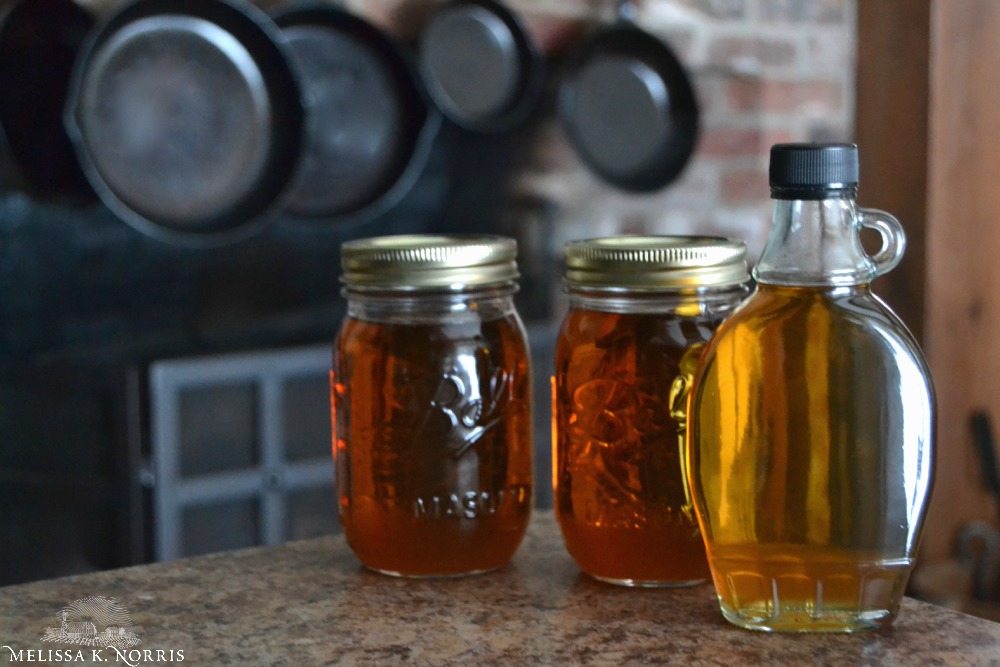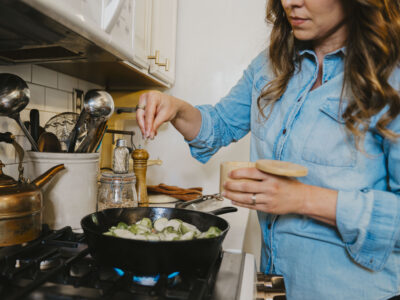The health benefits of maple syrup are something the pioneers and homesteaders of old benefited from long before we had the science of today to show us the individual components. Learn the exciting and some newly discovered health benefits of using this old time sweetener at home as well as tips for making this delight yourself or how to make sure you’re getting pure maple syrup if purchasing yourself.
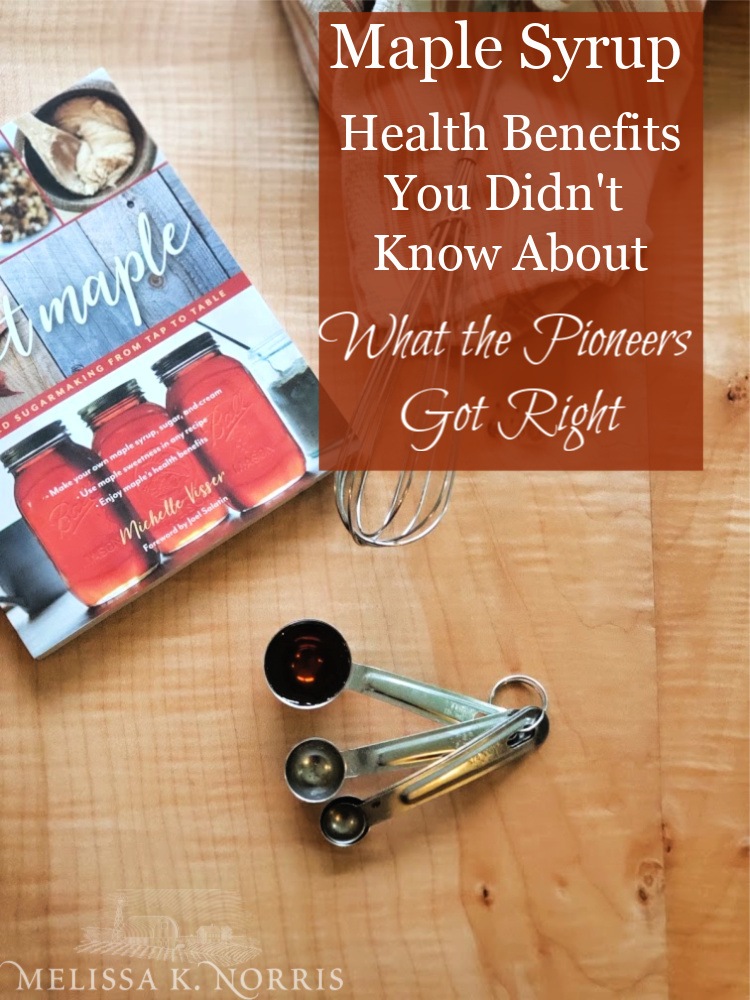
I’m excited to learn more about the many health benefits of maple syrup. Michelle Visser, from SoulyRested, first gave us so much information on maple syrup in Podcast Episode #125 – Homemade Maple Syrup – How to Tap, Make Syrup, & Baking Tips. Today we’re going to dive deeper into the many health benefits, the types of trees that can be tapped, explain how to keep the tree healthy for many years to come, and ways that maple syrup can be used in foods and drinks.
🍞 Struggling With Sourdough?
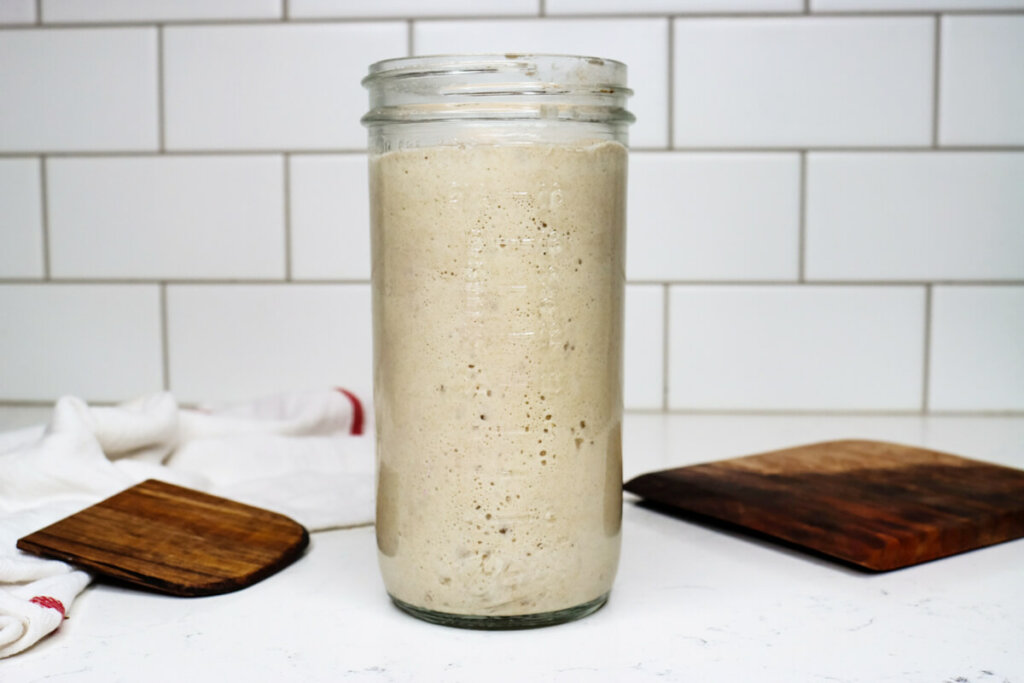
If your starter won’t take off, your loaves are dense and hard, or sourdough just flat-out overwhelms you…
👉 I’ll show you how to fix all of it.
Join my FREE workshop and learn how to make a bubbly, active starter—the right way, from Day One.
Natural Remedies Made Simple

Start your home apothecary with confidence—even if you’re brand new. Learn how to choose the right herbs for your body using the simple principles of herbal energetics.
Discover how warming, cooling, drying, and moistening herbs affect your body—so you can stop guessing and start making remedies that actually work.
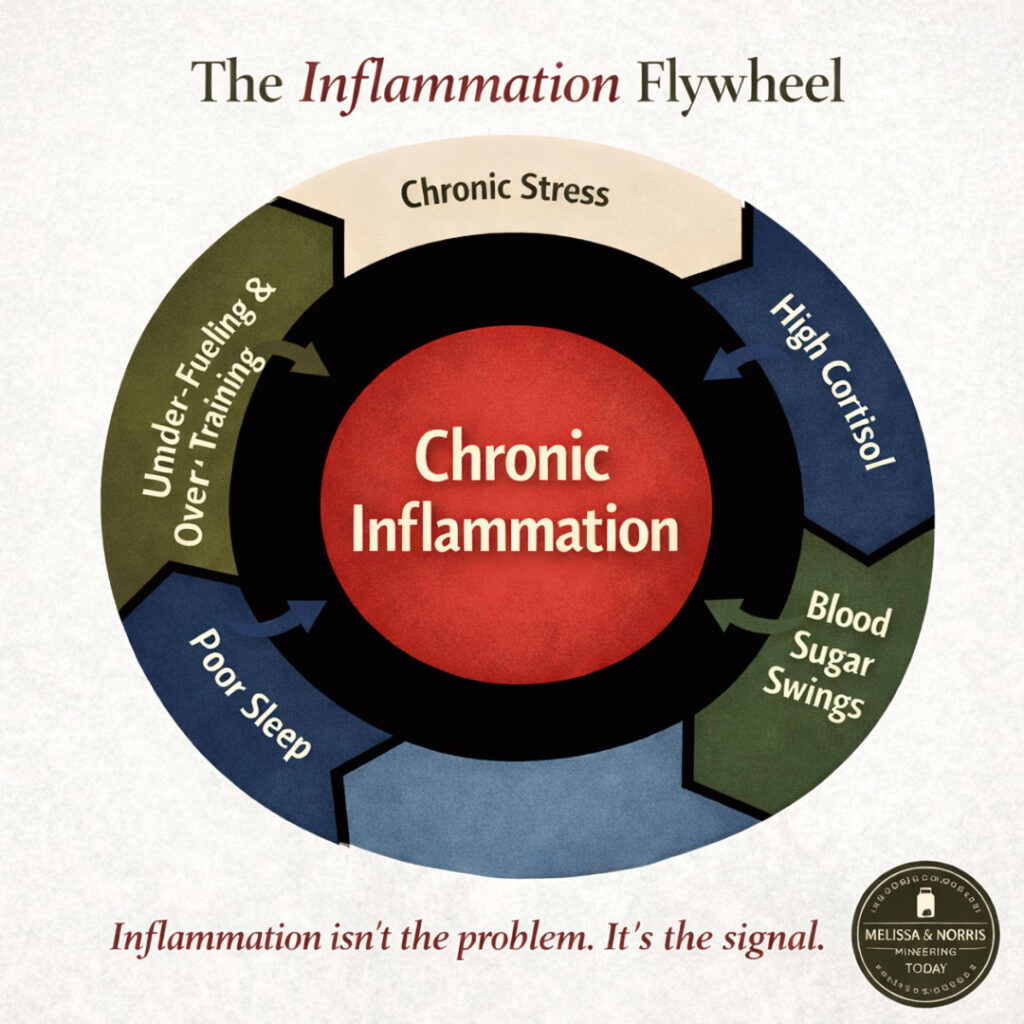
The Hidden Cycle Keeping You Inflamed
If you’ve been feeling puffy, tired, achy, or wired-but-tired, this two-page guide will help you understand what may be happening behind the scenes — even if you’re eating “healthy.”
Download the Inflammation Flywheel Guide and learn:
- Where to start so you don’t feel overwhelmed
- The 5 most common drivers that keep inflammation switched on
- Why blood sugar swings, stress, and poor sleep feed each other
It’s important to note that I am not a certified medical practitioner. This post is not intended to diagnose or treat but is for informational purposes only. Please contact your healthcare professional before introducing new herbal and natural remedies into your wellness routine.
Michelle Visser is a homesteader in rural New England. In their 219-year-old farmhouse and on their 14 rocky, tree-filled acres, her family makes an effort to live life a little more simply by growing some of their own food, raising a few farm animals, and making their own all-natural maple sugar. Michelle has been featured in Whole Foods Magazine, Capper’s Farmer, and Mother Earth News. Her new book, Sweet Maple, is an instructional book on backyard sugarmaking that’s also the story of the family’s connection to the past on their small sugar farm and a cookbook, filled with more than 30 maple-infused recipes.
Listen in below to the full podcast, Episode #208 Homemade Maple Syrup – Health Benefits, Types of Trees to Tap, & Tree Health of the Pioneering Today Podcast, where we don’t just inspire you, but give you the clear steps to create the homegrown garden, pantry, kitchen and life you want for your family and homestead.
Table of Contents[Hide][Show]
- 7 Health Benefits of Maple Syrup & Ways to Use It
- Why Use Maple Syrup?
- What to Know About Purchasing Maple Syrup
- Does Tree Variety Affect Flavor?
- Trees That Can be Tapped
- Tree Health
- Best Maples for Syrup
- Using Maple Syrup in Your Food
- Where to Find More Information
- Recipes Using Maple Syrup That You May Enjoy
7 Health Benefits of Maple Syrup & Ways to Use It
Melissa K Norris (MKN): When we look back at our past at the pioneers, a lot of them didn’t have the ability to grow sugarcane, didn’t have our refined sugar or even organic evaporated cane juice (that still has some of the molasses in it) like we do now. A lot of their sweeteners were things that they could produce from their own land. Of course, there were honey bees – so honey was an option, but where maple trees could grow they were able to get maple syrup, which isn’t used as much in our modern cooking as it used to be.
I’m really excited to dive into this topic even more with you today. You’ve found some fascinating things about the health benefits of maple syrup that they didn’t know back in the day that we do now through the benefit of science.
Why Use Maple Syrup?
Michelle, tell me why your family uses maple syrup instead of regular refined sugar or some of the better organic options available?
Michelle Visser (MV): Mainly it comes back to exactly what you were saying. We have the exact same process, for the most part, that they used 200 years ago: pulling the sap out of the trees, boiling it, and making syrup. In fact, backyard sugar makers pretty much are using the exact same procedures. The high tech sugar shacks now have more high finagled ways of doing it, but it’s still pretty much the same as it was 200 years ago.
We have the science now to realize what your grandparents had no idea about. This is one of the best sweeteners you could ever use. It’s amazing the more science is figure out. I was talking to a chemist not long ago in Canada and her findings blew me away. So we’ll get into all that.
That’s why we eat maple syrup, because, why not? Why have something that’s been so processed that it has nothing good for me in it if I can have this all natural choice, that is loaded with all these great things?
MKN: I’m so excited that it’s becoming more commonplace for society as a whole, even outside the homesteading fringe or the old-fashioned vintage minded people, to be using less refined sugar. Most of the time people gravitate to using honey, especially raw honey because it has some great properties. But when talking about cooking and baking, the heat can destroy some of the properties.
Can you walk us through the difference between using honey and maple syrup and why use one or the other?
MV: For one thing, it comes down to calories. Comparing honey to maple syrup – I don’t have the numbers in front of me – but when looking at tablespoon to tablespoon it’s not a lot, but when baking where you’re using a half cup, whole cup, etc. it’s a lot. Now, I’m not knocking honey. We actually have an apiary, our own hives. I love honey. If fact, we grow a ton of sunflowers here on our homestead, so we have sunflower honey. It’s delicious. Trust me, I use both maple and honey, but if I have to choose, I would definitely go with the maple. I love the process of making it better, I love the taste a little bit better and it has less calories.
MKN: After reviewing some information you shared with me, it’s not just less calories, but it actually has less grams of carbs, which is exciting for those who are looking at keeping their carb count low, especially when looking at the glycemic index. This is helpful for those that are pre-diabetic, diabetic, or are really trying to be conscious of that, maple syrup really shines. Do you want to talk to us more about that? (Source) (Source)
MV: Absolutely. Maple falls pretty well on the glycemic scale. Basically food that fall under 55 are considered better. If someone has diabetes, you still have to very careful. If you are diabetic and are craving a sweetener, maple is a better choice. It comes in at 54, while honey is at 58 and refined sugar at 65. So a diabetic can’t even think about refined sugar but maple in a small quantity is something they can do.
MKN: Now, there’s maple syrup and there’s maple sugar. So are you talking about when it’s in the syrup form or when it’s sugar form?
MV: That’s for syrup. I’ve never thought about where maple sugar might fall when it’s processed down to sugar from syrup. I need to go ask a scientist. Great question.
MKN: If any listeners know, lets us know in the comments. I’m super curious because I’ve used both. I use maple syrup more just because it’s easier for me to get, but I know it can be further processed down to actually make sugar, which is more concentrated because the liquid has been more evaporated that it was for syrup. I would think it’d be more because it’s more concentrated than the maple syrup, but I don’t actually know.
What to Know About Purchasing Maple Syrup
I know you have maple trees that you tap yourself, but if you’re not able to tap maple trees and purchase it, what are some things that people should know?
MV: First think is you absolutely want to make sure it’s 100% all natural maple syrup. It’s amazing the things that people will market and sell that looks like maple syrup until you closely look at the label and realize it’s just maple flavored. If you have all natural 100% maple syrup, you really can’t go wrong. Even then you’re looking for the best. I highly recommend finding a single source producer. It doesn’t have to be someone local, like what is recommended with honey because it has the allergens to help you with your allergies. If you have any allergy problems in your local honey, that’s not the case with maple. You can source it from anywhere. What I do highly recommend is going to someone that’s a single source producer.
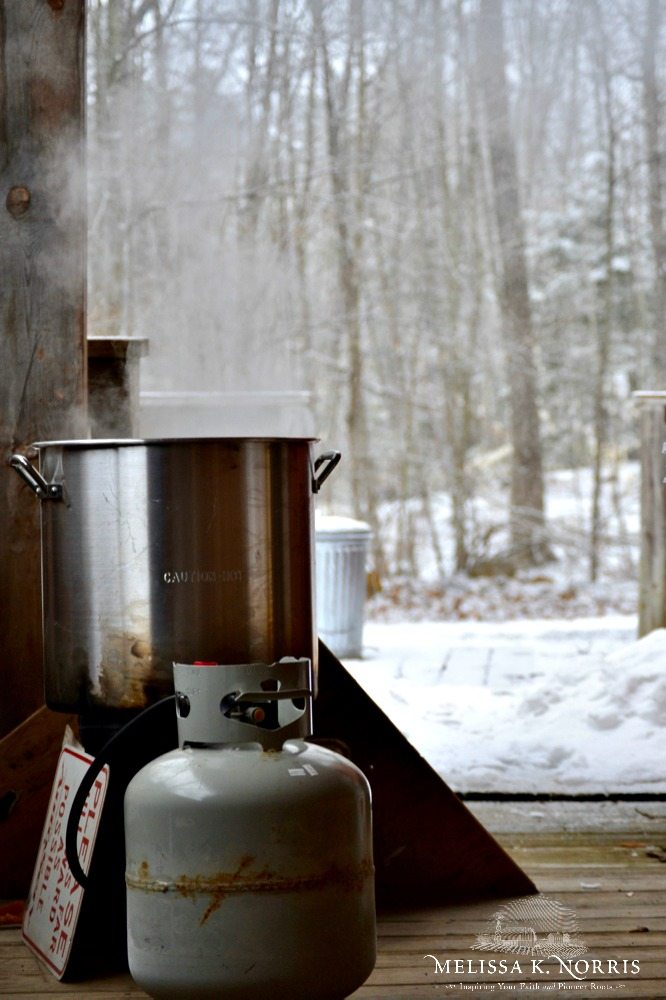
So it’s literally made at the sugar shack. They’re putting it in bottles and then selling it. Versus if you go to your grocery store, which there’s nothing wrong with it because it’s still 100% maple syrup, but the crazy thing is that the syrup in that jug that you pull off the shelf could be sourced from 482 different producers across the country. They ship giant barrels of sap and they also ship giant barrels of syrup to different people or companies who are then bottling it and selling it for the big producers. It’s still genuine real tree sap but it’s been processed slightly different. Some folks might be filtering it differently and they might be using different ro (reverse osmosis) setups. Some might be using different wood to fire it and all that’s ok, but if you find one that you love the taste, you’re going to find that it varies if you go somewhere else, if that makes sense. So when you get it from a big box store, it’s a conglomeration and it’s just never going to be as tasty and delicious.
Does Tree Variety Affect Flavor?
MKN: That’s really interesting because my hand is raised here. I get my 100% no additives maple syrup from Costco. I live in Washington state in the Pacific Northwest and we don’t have very many sugar maple.
MV: You know what you do have is big leaf maple. That’s something you can look into because they are wonderful for tapping. They make delicious syrup.
MKN: I know with honey the flavor is different depending on where the bees are getting the nectar from, like you said you grow sunflowers so that gives your honey a different flavor, but I didn’t realize that you would get different flavors of your maple syrup.
Do you find the big leaf maple syrup versus sugar maple syrup just has a different flavor? Or, depending on the type of maple that you have been tapping from to then make the maple syrup, does that change the flavor as well?
MV: It all definitely changes. To be honest, I’m not really picky about my maple syrup, so I have trouble saying, “Oh, I like this one better than that one.” I had a reader send me a couple jars of big leave maple syrup infused with lavender and the other one was infused with vanilla, so I can’t tell you unadulterated how it tastes. I’ve not had big leaf that didn’t have the infused flavors, but it was absolutely delicious. I can tell you that.
MKN: Oh my goodness, my mouth is watering just thinking about the vanilla with maple now. I’m so ready to do some baking now.
Pure Maple Syrup Health Benefits
I want to circle back to some of the health benefits of maple syrup. Are there some properties where it really shines over some of the other sweetener options?
MV: The more I dug into this the more it blew me away. When I was writing my book, Sweet Maple: Backyard Sugarmaking from Tap to Table, I realized I had to devote an entire chapter just to the science behind syrup because it’s mind boggling. Scientists are discovering new things all the time about maple syrup. In fact, there hasn’t been a lot of studies done on the properties of maple syrup like there have with honey, for instance, that has been studied a ton and they know a lot about. But maple syrup for some reason just hasn’t really been delved into a lot, but the health benefits of maple syrup vs honey is impressive.
There’s one scientist in Canada that I’ve spoken to that found an ingredient that she extracted from the syrup that has actually been shown to fight super bugs. This is brand new science, but their goal is to take this extract and put it in something that would be given to somebody when they’re taking their antibiotics. I don’t know if it’ll be in pill form but it actually increases the effectiveness of the antibiotic possibly as much as 90%, she was saying. So this whole super bug problem could be a thing of the past thanks to one property that’s been extracted from maple syrup. (Source)
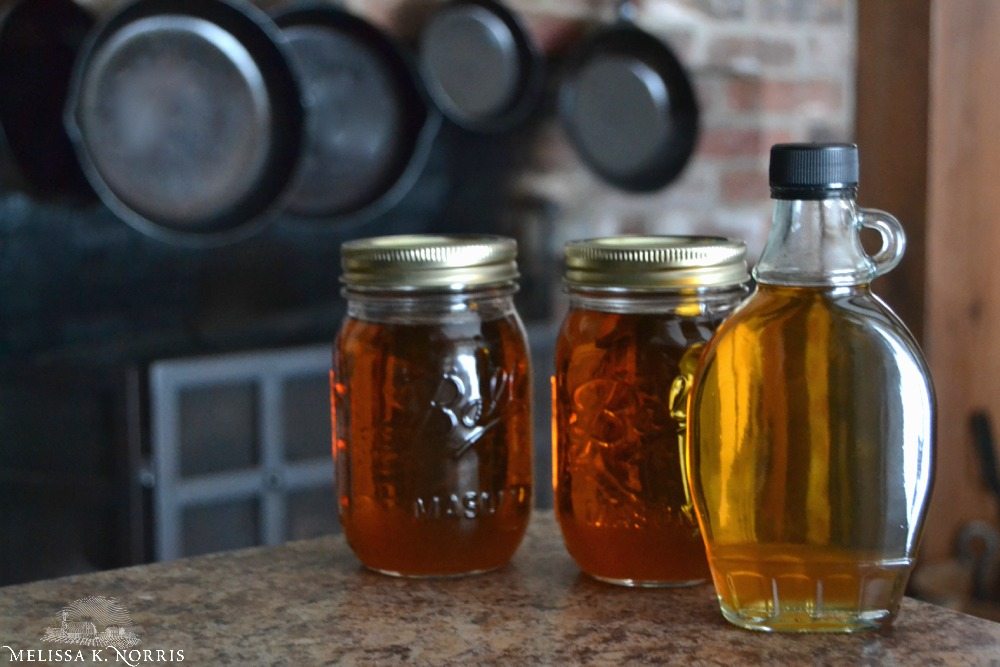
MKN: That’s fascinating. We do know that honey as antibacterial properties that can be of healing nature too, but I did not know that maple syrup did. That’s really exciting. I love that there are scientists that are actually looking at different natural elements to help and put into mainstream use. (Source)
1. Antioxidants
MV: She did caution me that I could not put anything in my book that made it sound like drinking maple syrup is going to help you with your antibiotics because it’s not. You really do have to extract this one component of it. As far as when eating it, I can tell you , first of all, you’re definitely getting antioxidants. We’ve all known for awhile that plant based foods are the best source for antioxidants. And, of course, maple syrup comes right from the tree. So it’s teeming with antioxidants. (Source) And, so far that the scientists have found, some antibiotics that you find in maple syrup are found nowhere else in nature.
2. Functional Food
Also, it’s considered a functional food. Functional foods offer more than just basic nutrition. In order for science to agree for a food to get this label, it has to have some other positive effects. For instance, oatmeal has fiber in it and it helps lower cholesterol. Another example is orange juice that has been fortified with calcium, that’s considered a functional food because now it has calcium to improve bone health. Of course, that has been altered or modified in some way. But, for multiple reasons and without any fortifying, 100% maple syrup is a functional food. So when you’re using maple syrup as a meat glaze, or on your pancakes, or in your coffee, you’re adding essential vitamins and minerals to your diet that you’re not going to find in other sweeteners. (Source)
MKN: From a homesteaders heart I tend to look at things more from a whole foods standpoint where it’s not really been altered. This is what we homesteaders consider our functional foods. But I think the more functional foods we put into our diet, the better foundation of health we’re giving our body and our systems that we possibly can.
When we use sweeteners, it’s for the taste, but a sweetener such as sugar doesn’t offer our body anything. In fact, it’s damaging our body. Not to say I’m a purist because I do still eat some regular sugar (organic cane sugar so it’s not quite as processed), but it does cause inflammation, breaks down cells in our body – not in a good way, and other things. So having another option is great. (Source)
3. Immune Boosting
MV: It is also immune boosting. Maple syrup is full of polyphenols and that improves the bodies ability to fight off problems. Isn’t it awesome? It kind of makes sense, like when you have a cold and you crave grandma’s chicken noodle soup, I personally crave to have some maple syrup in my warm tea of I’m not feeling well. My body knows that there’s something in there helping me. (Source)
4. Prebiotic
Scientists have discovered this complex carbohydrate call inulin in maple syrup. Inulin is a natural fiber that’s prebiotic. Prebiotics helps us digest nutrients and helps synthesize the vitamins that we’re eating and helps manage our weight. It’s mind boggling that you could be eating a sugar that has prebiotics in it that are actually counterbalancing slightly and helping you manage your weight. Now, that’s not to say you can’t eat too much maple syrup because you totally can. (Source)
Prebiotics:
- Make our bones stronger
- Helps fight carcinogens
- Keep our brain healthy
I have loved ones that were fighting Alzheimer’s and as I was reading about this during my research, I wanted them to eat more maple syrup, because any little thing you can do to help with brain health, that’s fantastic.
5. Probiotic
Not only is it prebiotic, it’s also probiotic. Probiotics are live microorganisms that are the good bacteria for our gut. I’ve been fermenting kombucha, making switchel, sourdough bread, yogurt…so I’ve been fermenting for a long time. I’m adding those probiotics to my diet anyway but I had no idea that there’s probiotics naturally in maple syrup. (Source)
Probiotics:
- Promote heart health
- Help improve skin
- Help reduce depression
- Improve overall digestive health (Source)
Yeah, I’ll take that bonus of maple syrup.
MKN: Yeah, and the more diverse our gut microbiome is, the healthier our immune system. A lot of modern society are not eating food that have probiotics and prebiotics, but especially the probiotics which help sustain the gut microbiome and that good bacteria. A lot of the foods that have been highly processed actually are not friendly to those things. Having good diversity through eating yogurt, which as a couple different strains of the good bacteria. Then kombucha has a different type in it. Then you have sauerkraut and other fermented vegetables that also have different strains. The more diversity that we can enter into our gut to support it is so important for our health.
So having maple syrup bring in a different strain so that we have even more diversity and is completely natural and doesn’t require any effort on our part is fantastic.
6. Polyphenolic Properties
MV: It also has polyphenolic properties. One tablespoon of maple syrup has 20 milligrams of polyphenols. (Source)
7. Anti-Inflammatory
Researchers have found special properties in maple syrup that are definitely anti-inflammatory. So instead of feeling like you have to take ibuprofen, maybe adding a few tablespoons of maple syrup to your coffee might have a similar effect. (Source)
MKN: It’s pretty cool to have all of these health properties in just one food. But when you think back to our ancestors and the pioneer and homesteaders of old. They did die from infections, so antibiotics have their place in modern medicine. I’m not trying to discount that, but when you think about all of the newer diseases, and not just the newer ones, but it feels like an epidemic of the different diseases that we have now when we have all this tech and stuff. And then when you look back it didn’t seem like we had, and I don’t think it was just diagnosis – like we can diagnose things better now, that’s true, but I really feel like where we’re at in society now is that we have way more diseases like cancer and things like autism. Things we didn’t have the same scale of 50, 60 years ago. Now this is just my own personal opinion. But I have to wonder if it was because they were eating these types of foods that have all of these benefits as a much larger mainstay of their diet without the processed junk that general society eats on a more frequent basis today.
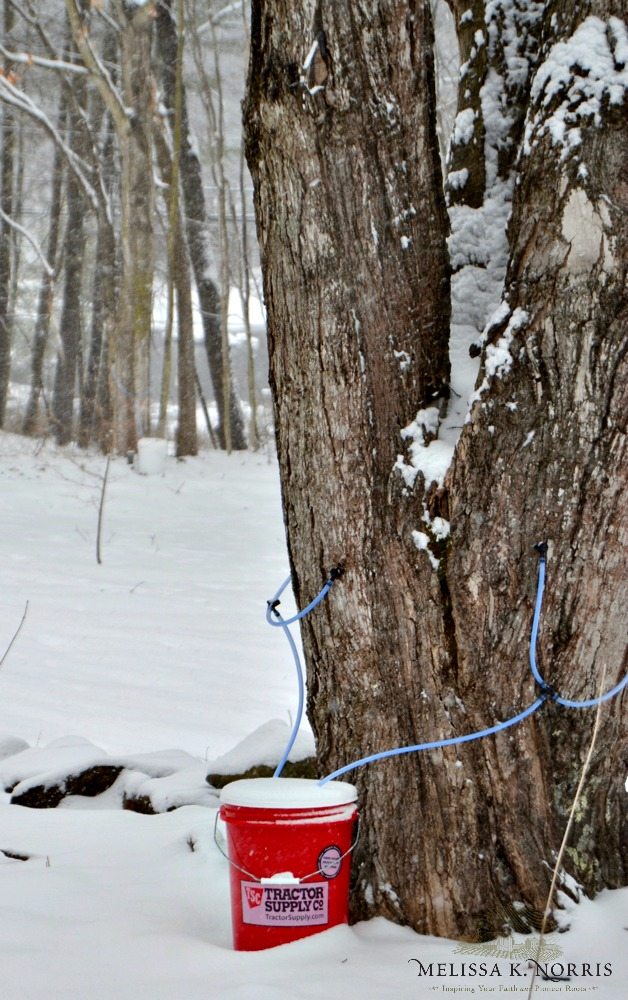
MV: I agree. I think it comes back to that it’s straight out of nature. We’re not doing any processing, not adding anything to it…well, except for a vanilla bean maybe. It’s directly from nature the way food was intended. That’s when we’re going to get back to the whole foods that have these properties that we don’t even know all the wonderful properties that they have in them. We’re just discovering more and more all the time.
Trees That Can be Tapped
MKN: That is super.
Can you talk about the different types of maple trees that are tappable to make our own syrup? My audience is from all over so give them an idea of what they can look for where they live and how much variety there is out there.
MV: It was really important to me when I wrote Sweet Maple: Backyard Sugarmaking from Tap to Table, it was a book that was useful to everyone, not just folds who are living in New England like I am. I really wanted to inspire around the world that they can find an appropriate tree and that they can make syrup from it. In Sweet Maple I have listed out 30 different varieties of trees that are productive. Basically it boils down to (no pun intended) the ones that are going to be the most productive, and the ones you want to look for first, are going to be, of course, the maple family, but also the birch family and the walnut family.
Now, mind you, your gonna need a lot more sap. The birch tree your going to need about 100 gallons of sap to make one gallon of syrup versus the maple. Maple is bad enough, you’ll need roughly 40 gallons of sap to make one gallon of syrup. So it’s a lot more collecting from a birch tree. A walnut tree is better; it’s more productive, but not nearly as good as the maple. With a walnut tree you do have a problem that you have a higher level of pectin in it. I often have readers reaching out to me asking, “what the heck is this? I tried to make walnut syrup and it’s like jelly.” Well, yeah, it is kind of jelly. The book breaks it down and tells you how, but you have to really make sure you get that pectin out if you’re tapping a walnut tree.
MKN: Now I’m all excited, because now I wonder if that could be used as a sweetener to make jam and jelly since it already has that pectin in it.
MV: I should have asked some readers to ship it to me. I don’t know.
I don’t waste anything in our whole sugar making process. A lot of people hate that niter develops. Niter (sugar sand) is minerals that have been collected in the sap, that when the excess water is boiled off, you wind up with this excess amount of minerals. I don’t mind if I get niter in my syrup because it’s fantastic for baking. It’s thick and creamy, but I wouldn’t want to eat it by itself because it doesn’t taste as good as maple syrup. But I totally use it for making cookies and cupcakes. I don’t waste a drop of it. So I’m with you, the walnut pectin jellies stuff might be really good.
Tree Health
MKN: I’m very intrigued by that. I do have a question about tapping your trees. I have no experience with it. Obviously it doesn’t kill the tree but does it weaken it by us harvesting the sap? Does it have any negative effect on the tree at all?
MV: I go into that in good detail in the book, but basically there are certain practices that you do want to follow and I outlined that as well. If you’re not concerned about the health of the tree for whatever reason, you can tap it willy nilly however you want and you’ll get a productive amount of sap for many years. But over time it is going to kill the tree if you don’t follow the safe regulations that they’ve developed in the sugar making world. If you follow these, basically is a matter of going in a circle around the tree as the years progress and by the time you get back around to the area you were in, you’re also higher up. So you circle around and upwards. If you do this in the right manner, you are not going to hurt the tree. You’re going to have generations after you still tapping that tree if you do it correctly.
Best Maples for Syrup
MKN: We talked about birch and walnut, and a little about different maples, like the big leaf and sugar maple. Is the sugar maple best for production? Like you get more syrup out of less sap because it has a higher sugar content?
MV: That’s what it is. In general, you’re going to get one gallon of syrup out of 40 gallons of sap. With the sugar maple it has a slightly higher concentration of sugar than other maples, but all the maples fall really high as far as percentage of sugar to sap. If you can find any maple tree whatsoever, I highly recommend tapping it. But, you had, let’s say for some crazy reason, hundreds and you only want to tap 50, then I would go around and find the 50 sugar maples because they are definitely the most productive and you’ll use less fuel, whether that’s wood or propane, or however you’re boiling it. You’ll use a lot less fuel with the sugar maple than any other maple.
Using Maple Syrup in Your Food
MKN: I know we’ve talked about maple syrup in depth here but could you tell us about other ways that you like to use maple syrup. Last time you were on, in episode 125, you shared with us a lot of great tips and ideas for using maple syrup in our baking, but could you give us more ideas for using it in our food and drinks?
MV: Yes, I share over 30 recipes in the book and they’re not all just sweet recipes; there’s also savory recipes. I love using maple syrup. Basically, if it’s a recipe that you would add brown sugar or refined sugar or honey, you can most likely substitute maple. In my opinion it usually turns out tastier. It’s a natural, simple syrup already. I love making maple lemonade; it’s delicious. You don’t have to worry about dissolving the sugar in your drink if it’s a cold drink because it’s already a liquid.
I love making kombucha with maple syrup. That’s a huge love of mine.
MKN: Talk to me about that because I am a kombucha fan. I always have continuous kombucha brewing. I adore kombucha but have not used maple syrup in it. Are you doing it in the first ferment or second ferment?
MV: Why would I not do it in both, Melissa? Now you do have to be careful. You can’t just take that continuous brew and in the next tea that you add to it use maple because you’ll probably kill your SCOBY because it’s used to whatever sugar you’ve been feeding it. So you can’t just dramatically change it over, but you can do it gradually. I have a course available about how to make a simple DIY kombucha and it explains in detail. I have a chart in there of exactly how I did it. But the short story is you gradually decrease whatever you’re currently feeding that SCOBY as far as a sugar source and increase the maple. You do that over a long period of time so that your SCOBY isn’t shocked at all. By the time you’re up to feeding it pure maple, it thrives and does well on that. Then you now have first ferment kombucha that is fed solely with maple syrup. So all of these wonderful properties we just talked about maple syrup, is now in your kombucha. Then I also use it in second ferment because then you really get to taste. If it’s in your second ferment that’s where you taste the maple more so than the first ferment.
MKN: I had read conflicting things on using honey with your SCOBY because it might inhibit or weaken it over time. I haven’t done my own research or testing with the honey to know one way or the other. I guess I never even thought of trying maple syrup because I was assuming in my mind that it might have the same possible negative effects on the long-term health of the SCOBY. But you’ve been really successful with the maple syrup and doing it and obviously haven’t had it as long as you did a slow transition. I’m glad you brought that point up.
MV: There really isn’t a lot out there that I could find about maple kombucha just to be honest with you. It could be that I find out five years from now that it killed my SCOBY. But so far I’ve been doing this for years and my SCOBY is thriving and I love it.
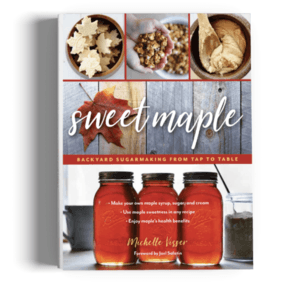
MKN: One of my favorite things about making kombucha homemade is because obviously you can choose different options on your teas that are going to give it a different flavor and you can control how sweet you want it. Even if I didn’t want to transition my SCOBY, I can still use it in the second ferment to see how I like the flavor and I don’t have to worry about killing my SCOBY.
Where to Find More Information
I know as a fellow author, how much research goes into creating a book. I mean months and years oftentimes in my experience in the actual research and writing. So thank you for sharing so much of what’s in the book with us. I saw that you have pretty cool bonuses for people when they purchase the book. Can you share some information on that with us?
MV: Yes, thanks for asking. Every purchase of Sweet Maple earns $75 in discounts on these items: free organic tea, a free hydrometer to measure the brix (percentage of sugar), discounts on an organic break-making kit, embossing rolling pin, mason jar flip lid, maple syrup, and even maple trees!
MKN: I know your book covers the health benefits and cool properties of maple syrup, and that there are different recipes in the book as well as information on tapping other types of trees, but does it also walk through the process of how to tap the trees and make the syrup from the sap?
MV: Correct, I even walk you through the part that I hate: the cleanup at the end of the season. True story, last year, I believe it was six weeks out from totally being done making the syrup before I even started to clean up because I just despite it. So the buckets sat out in the barn until I got to it. But I break down all kinds of times for even the cleanup. I included how to choose the right trees to tapping to boiling it and the different products you can use as you’re boiling it down, to how you filter it to how you bottle it and then to clean it all up.
For a sneak peak into Michelle’s new book (including a few delicious recipes): soulyrested.com/
To download Michelle’s conversion chart, for baking with maple syrup: https://soulyrested.
To download Michelle’s comparison chart, comparing maple to refined sugar: https://soulyrested.
You can redeem the bonuses here. You’ll find all the details about the bonuses, some snapshots inside the book, a whole bunch of reviews and what people have said. At the bottom of the page is the form to enter all your information and receipt number to redeem your bonuses. You can start taking advantage of them immediately.
